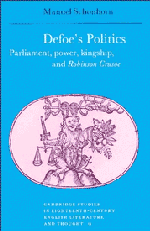Book contents
- Frontmatter
- Contents
- Dedication
- Preface and acknowledgments
- A note on attributions
- List of abbreviations
- Introduction
- 1 Defoe, dissent, and monarchy
- 2 Defoe's Reflections Upon the Late Great Revolution and the political languages of 1689
- 3 Defender of the king, 1689–1701
- 4 From the death of William III to Jure Divino, 1702–1706
- 5 Jure Divino
- 6 The politics of Robinson Crusoe
- Select bibliography
- Index
- Frontmatter
- Contents
- Dedication
- Preface and acknowledgments
- A note on attributions
- List of abbreviations
- Introduction
- 1 Defoe, dissent, and monarchy
- 2 Defoe's Reflections Upon the Late Great Revolution and the political languages of 1689
- 3 Defender of the king, 1689–1701
- 4 From the death of William III to Jure Divino, 1702–1706
- 5 Jure Divino
- 6 The politics of Robinson Crusoe
- Select bibliography
- Index
Summary
Perhaps it has been the obviousness of the satire in Jure Divino of those who believe in the divine right of hereditary succession that has denied it serious consideration. Perhaps the clarity of Defoe's prose notes has turned many to dismiss the “unreadable” poetry. After all, Defoe unequivocally stated that “[n] othing in this Book is design'd, or can be construed to Decry or Expose Monarchy, or the Sovereignty of Government by Kings; but to prove that they have no Powers immediately Deputed from Heaven superiour and un-subjected to the Good of those they govern; and that when they assume such a Right, they become Tyrants, Invaders of Right, and may be Deposed by the People they Govern” (II, 2). Nevertheless, despite its momentarily digressive populist and “Lockean” overtones, it is in Jure Divino that Defoe's scriptural and martial imagination disposed to the Book and the Sword orders his myth of the origins of government and kings.
Before he illumined the pattern of right monarchy from scriptural foundations in Book II of Jure Divino, Defoe explored in Book I the creation and the development of tyranny, to rehearse “The Crimes of Men, and Crimes of Gods” (I, 1). Invoking his muse of Satyr, Defoe shapes a negative, critical, and castigating record of man, politics, and government. Satyr's purpose is to “Trace the first Tyrants to their fancy'd Thrones” (I, 6).
- Type
- Chapter
- Information
- Defoe's PoliticsParliament, Power, Kingship and 'Robinson Crusoe', pp. 124 - 140Publisher: Cambridge University PressPrint publication year: 1991

